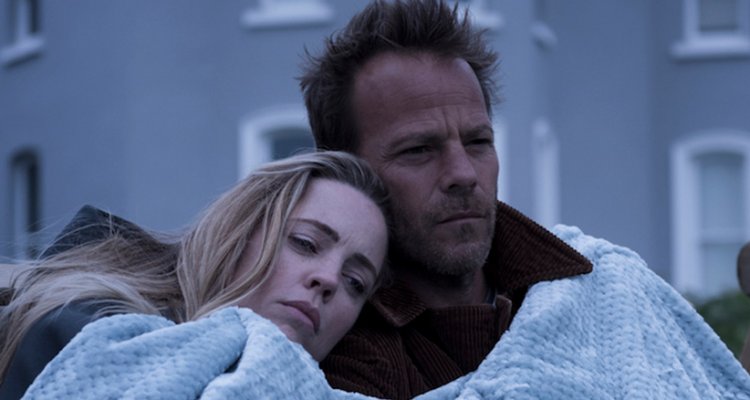A supernatural-flavored thriller with slow-burn sensibilities and decent character work, “Don’t Go” is a lot better than it has any right to be. Steeped in Hitchcockian tones with just a dash of supernatural sci-fi, the film moves well and is buttressed by consistent performances across the board. Though a bit shaky in the transition from its second to third act, to be sure, this doesn’t muddle what is an otherwise serviceable thriller.
When the audience is introduced to Ben Slater (Stephen Dorff), he’s going through the standard motions of hosting a wake with his wife, Hazel (Melissa George). Although it’s only made explicitly clear later on, images of a backyard playset and bicycle with no kids in sight paint a picture of what’s going on. Ben and Hazel lost their young daughter in a tragic accident, and both seem to wonder (quite understandably) how they will move on.
The answer finds them after a 6-month time jump, where the film catches up to Ben and Hazel in a quiet seaside town on the coast of Ireland. The couple has taken ownership of a hotel and seems to be doing well pouring their collective energies into this new venture. Ben, a novelist, has also found work in the local high school as a literature teacher. So, by all outward appearances, they seem to be adjusting to their new reality.
A recurring dream featuring his daughter haunts Ben, however, and try as he might, he can’t quite shake the overwhelming feeling that his unconscious musings represent something greater than just unresolved grief. An odd, cryptic message keeps appearing without any explanation in beach sands, crossword puzzles, and magazines, which combined with the dream leads Ben to suspect that greater forces are at work around him. Things only get more troublesome for Ben and Hazel with the reemergence of their hot-mess of a friend, Serena (Aoibhinn McGinnity), who forces them to confront many of the painful memories they left behind.
Audiences have seen this kind of thing before in films like “Take Shelter,” “Rosemary’s Baby,” or even “What Lies Beneath.” There’s the beleaguered Chicken Little protagonist with a powerful prophetic vision yet no one to believe him or her. The suspense of the story usually involves a push and pull between the lead and their loved ones, and depending on the script, there’s some wiggle room to allow the audience in on the secret of what’s actually going on leading up to the big reveal.
With these kinds of stories, it is rarely the mystery, but rather the journey to its resolution that sinks or elevates the material. Since the basic foundation of the narrative is something most have seen before, good character work, a defined sense of place, and evocative visuals can bolster the effort, and all are on display in “Don’t Go.”
The dialogue through most of the film is sharp and has a buoyancy that elevates it above the somewhat flat narrative. The script is credited to Ronan Blaney as well as director David Gleeson, and one gets the sense that different portions of the film belong to either one or the other. Ben’s interactions with his school’s faculty, his relationship with Hazel, and the conflict born out of Serena’s reemergence play well, and come off as organic. On the other hand, the basic components of the central mystery as it concerns the dreams and messages feels forced at times and sounds thin when spoken aloud.
It’s a credit to the character work and performances that these mystery portions feel a bit tedious, as they draw attention away from the intriguing and not-at-all supernatural drama laid into the foundation of “Don’t Go.” Gleeson does a fine job planting visual seeds that do eventually sprout during the third act of the picture, and as a whole, the effort holds together smartly once the mystery shoe drops and the truth of what’s going on with the dreams and messages reveals itself.
Engaging and briskly paced at a tight 92 minutes, “Don’t Go” finds a way to operate effectively in a well-worn cinematic groove made not at all redundant, here. Bolstered by a damn fine turn by Dorff, who carries most of the film, there’s more to like than dislike with this one. Hobbled by a sometimes clunky third act, the end result works well enough to push this one over the finish line, where a satisfying resolution and thoughtful visual foreshadowing does indeed pay off. [B]

